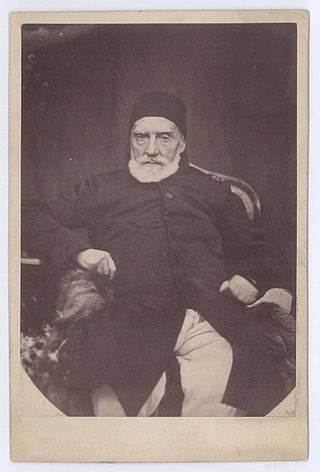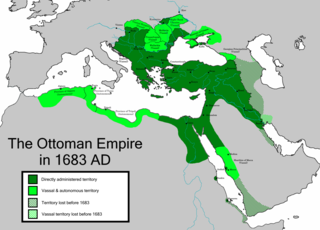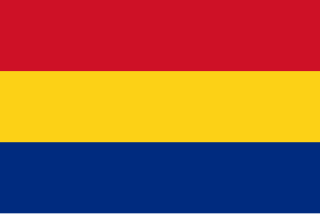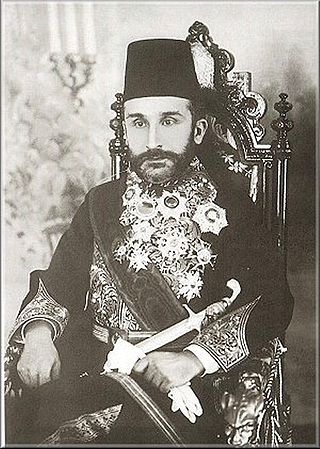
Samos is a Greek island in the eastern Aegean Sea, south of Chios, north of Patmos and the Dodecanese archipelago, and off the coast of western Turkey, from which it is separated by the 1.6-kilometre-wide (1.0 mi) Mycale Strait. It is also a separate regional unit of the North Aegean region.

Prince Stefan Bogoridi was a high-ranking Ottoman statesman of Bulgarian origin, grandson of Sophronius of Vratsa and father of Alexander Bogoridi and Nicolae Vogoride. Stefan and his brother Athanase were named Bogoridi after Boris I, the first Christian ruler of Bulgaria. Their parents were Ioan Vogoridi and Ana N.

Themistoklis Sofoulis or Sophoulis was a prominent centrist and liberal Greek politician from Samos Island, who served three times as Prime Minister of Greece, with the Liberal Party, which he led for many years.

The Ottoman Empire had a number of tributary and vassal states throughout its history. Its tributary states would regularly send tribute to the Ottoman Empire, which was understood by both states as also being a token of submission. In exchange for certain privileges, its vassal states were obligated to render support to the Ottoman Empire when called upon to do so. Some of its vassal states were also tributary states. These client states, many of which could be described by modern terms such as satellite states or puppet states, were usually on the periphery of the Ottoman Empire under suzerainty of the Sublime Porte, over which direct control was not established, for various reasons.
Alexandru Callimachi or Alexandros Kallimachis, son of Scarlat Callimachi, fled Moldavia with his mother and other members of his family in 1821, at the time of his father's death. The family sought refuge in Russia, where Alexander finished his studies, at the University of Kyiv. After traveling through Europe, he made his way to the Ottoman Empire in 1829, where his family possessions and titles were restored to him.

The Principality of Samos was an autonomous tributary state of the Ottoman Empire from 1834 to 1912. The island of Samos participated in the Greek War of Independence and had successfully resisted several Turkish and Egyptian attempts to occupy it, but it was not included with the boundaries of the newly independent Kingdom of Greece after 1832. Instead, in 1834 the island was granted self-government as a semi-independent state.

The United Principalities of Moldavia and Wallachia, commonly called United Principalities or Wallachia and Moldavia, was the personal union of the Principality of Moldavia and the Principality of Wallachia. The union was formed 5 February [O.S. 24 January] 1859 when Alexandru Ioan Cuza was elected as the Domnitor of both principalities. Their separate autonomous vassalage in the Ottoman Empire continued with the unification of both principalities. On 3 February [O.S. 22 January] 1862, Moldavia and Wallachia formally united to create the Romanian United Principalities, the core of the Romanian nation state.

The Military-Political System of Samos was a provisional regime that existed in the island of Samos during the Greek War of Independence.

Miltiadis Stavraki Aristarchis was the Ottoman-appointed Prince of Samos from 1859 to 1866.

George Berovich, known as Berovich Pasha was a Christian Ottoman statesman who served as Governor-General (wāli) of Crete and Prince of Samos.

Stephanos Mousouros (1841–1906) was an Ottoman Greek diplomatic official of the Ottoman Empire, who served as ambassador to Italy and the United Kingdom, and was the Ottoman-appointed Prince of Samos from 1896 to 1899.

Konstantinos Karatheodoris (1841–1922) was an Ottoman Greek statesman, who was a member of the distinguished Phanariote Karatheodori family. He served as the Ottoman-appointed Prince of Samos from 1906 to 1907. He was the younger brother of the diplomat and statesman Alexander Karatheodori Pasha, who also served as Prince of Samos from 1885 to 1895.

Andreas Kopasis was the Ottoman-appointed Prince of Samos from 1908 to 1912. His tenure was widely regarded as pro-Turkish and tyrannical. His bringing in of additional Ottoman troops in 1908 caused a revolt to break out among the Samians, which was quelled brutally by further Ottoman reinforcements. The leaders of the pro-Greek opposition, including Themistoklis Sophoulis, fled the island for Greece. Kopasis was assassinated by a pro-Sophoulis agent on 22 March 1912.

Georgios Georgiadis was the Ottoman-appointed Prince of Samos who reigned briefly from 1907 to 1908.

Konstantinos Vagianis or Kostaki Vayanis Éfendi was a Prince of Samos between March 7, 1899, and 1900. He succeeded Stephanos Mousouros and was in turn succeeded by Michail Grigoriadis on August 16, 1900.

Konstantinos Adosidis (1818–1895) was the Ottoman-appointed Prince of Samos from 1873 to 1874, and again from 1879 to 1885.

Alexandros Mavrogenis Bey was the Ottoman-appointed Prince of Samos from 1902 to 1904.

Lykourgos Logothetis, born Georgios Paplomatas, was a Samian who became the island's leader during the Greek War of Independence.

Konstantinos Mousouros, also known as Kostaki Musurus Pasha, was an Ottoman Greek diplomatic official of the Ottoman Empire who served as ambassador to Greece, Austria, Great Britain, Belgium, and the Netherlands.

Eastern Sporades or Eastern Islands was the name of one of the thirteen divisions created in 1828 with the administrative division of the newly formed Hellenic State by the government of Ioannis Kapodistrias.


















